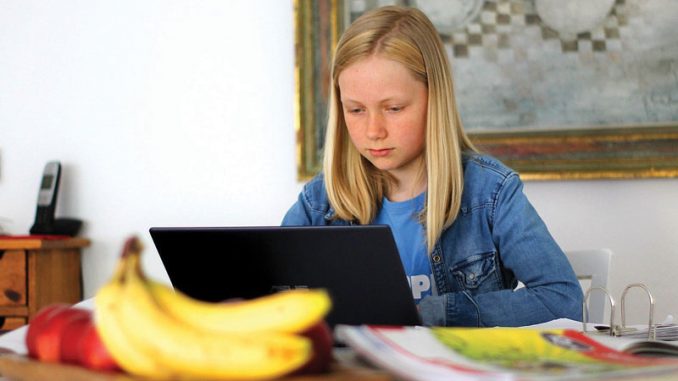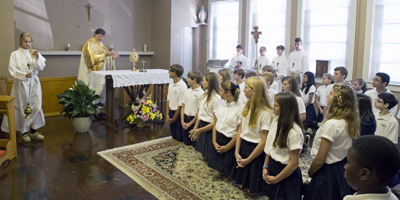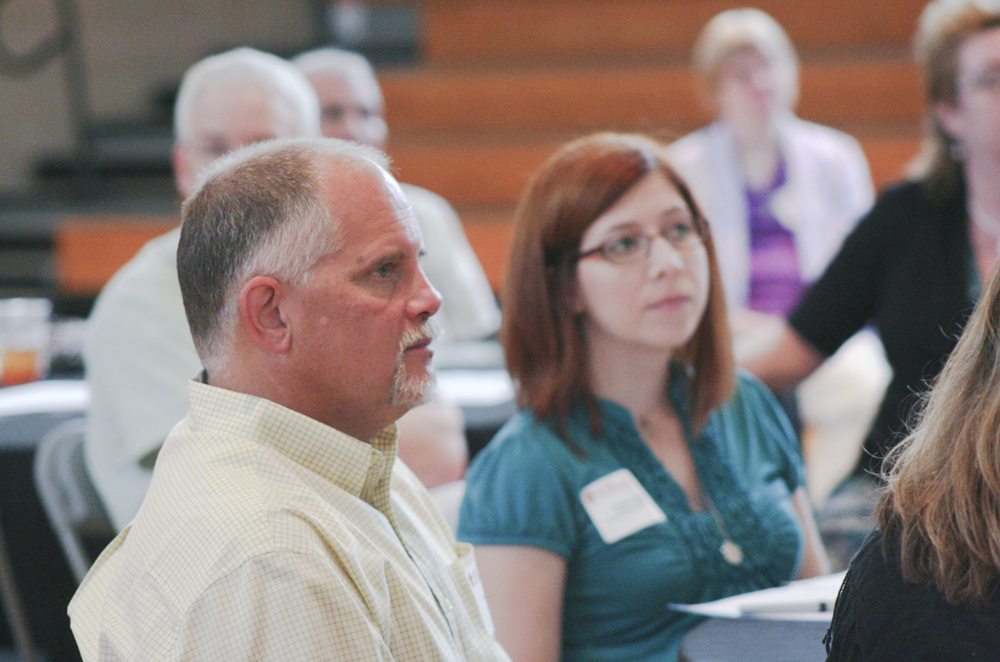
CHARLESTON—As the threat of the coronavirus continues to loom and schools discuss strategies for reopening, parents face a tough choice deciding the best and safest way to educate their children.
Do they return to a brick-and-mortar school, opt for virtual learning, or choose homeschooling?
Carly Hughey of Charleston has been homeschooling her children since 2012 when her oldest son was in first grade. She now has five children ranging in age from 14 to 4 years old and attends St. Joseph Church.
Her son actually attended public school kindergarten but she decided to homeschool the following year because of his hectic schedule and a desire to teach the Catholic faith.
“Homeschooling looks pretty different for us than it did 8 years ago. We have added more children to our family, so I have a pretty wide age-range of kids that I am schooling,” she said, adding that preschool and early elementary years are her favorite because as kids get older they have more work to get done in a timely manner.
Hughey said she hopes parents aren’t daunted by what happened in March, when the pandemic hit and parents were suddenly in charge of overseeing their child’s education.
“Teachers were given a few days to come up with a plan. Parents were forced into virtual schooling from home. It was stressful. Life came to a very unexpected halt, and it was hard! Don’t base homeschooling off of that,” she said.
Chaos was exactly what ensued in Kim Capelle’s household in Greer when schools shut down.
Capelle, who attends Prince of Peace Church, has 10 children ranging in age from 35 to 12 years old. She homeschooled her older children, but her younger ones attend Catholic school.
All of the children, from college on down, were home doing virtual learning. She found that being diligent on checking the assignments for her children, especially her youngest, was key.
“I really just had to sit with him and make sure the work got done,” she said. In the end the success came from giving her children space and not enforcing such a structured day. Although it has been difficult, she has appreciated the “reset” that this time has provided.
“It has brought our large family, that is usually scattered about, closer together,” Capelle said.
That sense of community is an important aspect of homeschooling for Erin Groeber, who has five children ages 12, 10, 8, 5 and 2.
Groeber said it took “a lot of prayer” to decide to try homeschooling. She decided to give it a year and see how it went.
It was the support she received from other homeschooling moms that was a major key to their success, she said. She is a part of the Sts. Francis and Clare Homeschool Community in Charleston.
“We meet every Friday for recess. There are sometimes up to 30 children. The moms even do dinners together and sometimes we even have shared lessons for different subjects like art and drama,” she said. They also plan field trips together.
Groeber does not use virtual learning, but said there are plenty of curriculum resources out there for parents to follow.
Parents can homeschool through a variety of programs, or choose a virtual school such as South Carolina Virtual Charter School, which is accredited through AdvancED.
Traditional schools are also planning ahead with options and contingencies for the year. Bill Ryan, superintendent of Catholic Schools, said their first choice is to have children back in the classroom, noting that CDC and local guidelines will be followed for the safety and wellness of everyone.
“We’ve taken a look at almost every aspect to make sure students are safe,” he said.
Catholic schools are set to open for in-class instruction the week of Aug. 17. However, each one has also developed and designed a distance-learning plan and are well prepared to go virtually if needed, Ryan said.
Lainie Berry, director of innovative and digital learning for Charleston County School District, said parents won’t need not worry about what to teach their children if they end up doing remote learning.
Berry explained that teachers are preparing now for the possibility of distance learning, adding that professional learning sessions will be offered to prepare them for teaching in a blended learning setting, moving between face-to-face and virtual.
“One of the big initiatives related to this is the shift to using Canvas, the district’s Learning Management System,” she said. “Canvas will serve as a common platform to facilitate a safe, secure, and streamlined learning environment for all students.”
Susanna Bleyer, who attends St. Andrew Church in Myrtle Beach, is the director of a local homeschool cooperative, Pathways for Scholars.
She said cooperatives are a great way for parents to learn the ropes. The hands-on program assists families with curriculum, conducts weekly classes, writes and distributes lesson plans, and provides a social and interactive academic environment for students. The students that participate in the cooperative meet once a week for group classes and then complete the remainder of the week at home, Bleyer explained.
She knows many parents fear that their child will miss out on social and sports-related activities, but in her experience, her children played more sports than they would have time for in a regular brick-and-mortar setting.
For more information on homeschooling, visit www.hslda.org/legal/south-carolina. For virtual learning, visit South Carolina Virtual Charter School, or call your local school for details.



